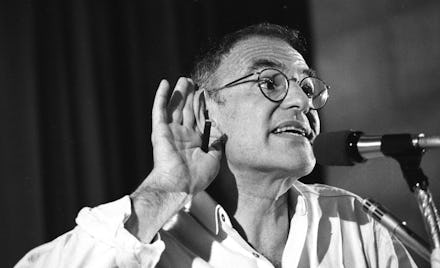Larry Kramer, outspoken AIDS activist and celebrated writer, has died

Susan Sontag called him “one of America’s most valuable troublemakers.” On Wednesday, the world lost a priceless soul.
Larry Kramer, the celebrated writer whose antagonistic activism helped shift America’s response to the AIDS crisis, died on May 27 in Manhattan at the age of 84. The cause was pneumonia, according to his husband, David Webster. Kramer had battled illness for much of his life. In 1989, he learned he’d contracted H.I.V., the virus that causes AIDS; he also developed liver disease and underwent a successful organ transplant in 2001.
Kramer’s life work significantly impacted the art world as well as human rights. He was an author, essayist and playwright, particularly celebrated for his 1985 autobiographical play The Normal Heart. Set during the rise of the AIDS crisis in New York City between 1981 and 1984, the play centers on the gay founder of a prominent H.I.V. advocacy group. Kramer’s protagonist favors loud, public confrontations, whereas his colleagues favor a calmer, privater approach, and the clash threatens to undermine their mutual mission.
The play paralleled real tensions within the budding AIDS advocacy movement at the time. Kramer was a fiery proponent of aggressive, disruptive protest as a tool to get the government to take the health crisis seriously. In 1981, he helped found the Gay Men’s Health Crisis, the first organization serving H.I.V.-positive individuals. As dramatized in The Normal Heart, Kramer’s fellow directors expelled him from the group a year later; he retaliated by calling them “a sad organization of sissies.”
Kramer went on to found a more combative group, Act Up (AIDS Coalition to Unleash Power), in 1987. They engaged in dramatic acts of civil disobedience to demand sped-up research and access to experimental antiviral drugs. In September 1989, for example, seven Act Up members chained themselves to the VIP balcony at the New York Stock Exchange to protest the high price of AZT, the only approved AIDS drug at the time. They also staged a massive, controversial die-in at St. Patrick's Cathedral in December 1989, protesting the Catholic church’s public opposition to safe sex education. It remains one of the largest protests ever staged against the church — 4,500 people showed up and more than 100 were arrested — and was dramatized on FX’s critically-acclaimed drama Pose in 2019.
Kramer was consistently direct in his criticisms, routinely accusing politicians of “murder” and “genocide.” According to The New York Times, he once introduced New York Mayor Edward I. Koch to his pet wheaten terrier as the man responsible for “killing Daddy’s friends.” But Kramer’s provocations were part of a more sophisticated strategy: to shock the public into confronting AIDS as a health emergency that affected the entire population, not just a marginalized few.
The author and activist also took aim at Dr. Anthony S. Fauci, longtime director of the National Institute of Allergy and Infectious Diseases, calling him “an incompetent idiot” and a killer in a letter published by The San Francisco Examiner in 1988. But the two became friends over the years; when Kramer had a liver transplant in 2001, Dr. Fauci helped get him into a lifesaving experimental drug trial afterward, according to The New York Times. Dr. Fauci acknowledged that Kramer played an “essential” role in the search for effective AIDS treatments, helping him to see how the federal bureaucracy was slowing down the search for lifesaving drugs.
Essentially, Kramer was the squeaky wheel who got the grease — with the effect of saving countless lives. “Once you got past the rhetoric,” Dr. Fauci told The New York Times for the writer’s obituary, “you found that Larry Kramer made a lot of sense, and that he had a heart of gold.”